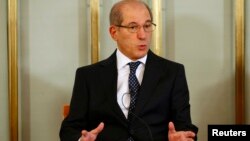OSLO —
The removal of chemical weapons from Syria may be delayed slightly due to the difficulties of operating during a civil war, the head of the global chemicals weapon watchdog OPCW said on Monday.
Any hold-up should be small, though, and the mid-2014 deadline to destroy these weapons remains realistic, said Ahmet Uzumcu, whose Organization for the Prohibition of Chemical Weapons (OPCW) has been charged with supervising the destruction of Syria's chemical arsenal.
The most dangerous chemical weapons have to be removed by Dec. 31 while weapons in a second category have to be shipped out by Feb. 5.
“In view of the circumstances in this country, it will be quite difficult to meet this timeline,” said Uzumcu, who also is in Oslo to accept the 2013 Nobel Peace Prize. “There are very demanding timelines that we want to fulfill and I'm confident that the deadline of end of June next year [to destroy the weapons] will be met.”
The Hague-based OPCW was given the task of overseeing destruction of Syria's chemical weapons stocks following a sarin gas attack on the outskirts of Damascus in August which killed hundreds of people. The deal, in part brokered by Russia, averted U.S. missile strikes.
Uzumcu said difficulties included security, particularly on secondary and access roads to various facilities, and the strict verification process that required extensive cooperation with the administration of Syrian President Bashar al-Assad.
Any hold-up should be small, though, and the mid-2014 deadline to destroy these weapons remains realistic, said Ahmet Uzumcu, whose Organization for the Prohibition of Chemical Weapons (OPCW) has been charged with supervising the destruction of Syria's chemical arsenal.
The most dangerous chemical weapons have to be removed by Dec. 31 while weapons in a second category have to be shipped out by Feb. 5.
“In view of the circumstances in this country, it will be quite difficult to meet this timeline,” said Uzumcu, who also is in Oslo to accept the 2013 Nobel Peace Prize. “There are very demanding timelines that we want to fulfill and I'm confident that the deadline of end of June next year [to destroy the weapons] will be met.”
The Hague-based OPCW was given the task of overseeing destruction of Syria's chemical weapons stocks following a sarin gas attack on the outskirts of Damascus in August which killed hundreds of people. The deal, in part brokered by Russia, averted U.S. missile strikes.
Uzumcu said difficulties included security, particularly on secondary and access roads to various facilities, and the strict verification process that required extensive cooperation with the administration of Syrian President Bashar al-Assad.




